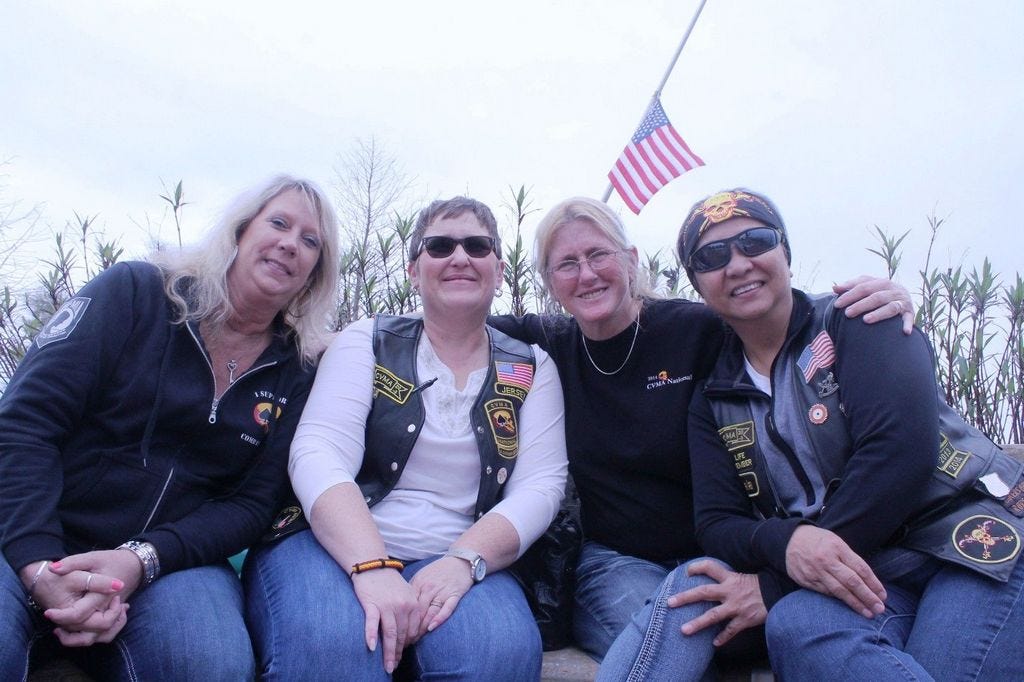
MILTON — Santa Rosa County’s residents certainly support the military.
Whether they’re honoring service members with a breakfast at a middle school or recognizing NAS Whiting Field’s volunteer efforts, the military has no shortage of allies in the Milton, Pace and Gulf Breeze areas.
However, four combat veterans’ significant others know the challenges and triumphs of supporting military on a personal level.
Betty Vukovcan’s, husband, Joe, served 1975 to 2008 in the U.S. Navy as command master chief on the USS Truman with the VFA 37 F-18 Strike Fighter Squadron. He served in the Mediterranean and Persian Gulf and conducted missions over Iraq.
Mila Duncan’s husband, Garry, served 1977 to 2007 in the US Navy as lieutenant commander-LDO (limited duty officer). He served as both enlisted and an officer.
Mary Mabie’s husband, Ken, served 1970 to 1972 in Vietnam.
And Phyllis Heath’s significant other — who asked that his record not be included — is among Combat Veterans Motorcycle Association members experiencing military combat’s after effects, namely post-traumatic stress disorder.
‘IT CAN CAUSE A LOT OF CHAOS’
For combat veterans, military life sharply contrasts with the homefront, according to Vukovcan.
“They live in a structure for six months on a ship where it's nothing but structure, then they come home to chaos because there's children and real life,” she said.
While deployed, officers have subordinates who follow orders to save lives and complete missions. But when they return home, Vukovcan said, “If a kid doesn't do what they tell them, they're not used to that. They're used to a couple hundred guys the same age doing what they tell them.
“It can cause a lot of chaos. A kid normally listens, but (veterans) don't have the patience a normal father would.”
Vukovcan and Duncan said another challenge is sharing authority when their husbands are home just six months out of the year.
“Sometimes, you want to give them their home, their responsibility,” Duncan said. Other times, the spouses butt heads. “But we love our spouses. You’ve got to love them.” Listen to more from Mila here.
‘YOU WANT THEM TO BE BETTER’
Mabie’s husband, who served in Vietnam 44 years ago, still deals with nightmares. “A couple days ago, for example, he was up and down all night,” she said.
Her husband still suffers agent orange’s effects, which she said looks like eczema.
“You feel for that person because you care about them so much and you hate what they're going through,” Heath said. “You try your best to relate, but … sometimes you feel helpless in a situation like that. Sometimes they just need to be by themselves and deal with it.
“They're not asking you to fix it, but as a person who loves them, you want to fix it because you want them to be better; not suffer.”
‘IT’S ALL BECAUSE OF THAT BROTHERHOOD’
Family involvement often provides the turning point for veterans with PTSD, Duncan said.
“You finally have to tell them, ‘There's something wrong. You need to see a therapist,’” she said. “It affects the family and it's not the norm.”
“When they love you, they’re going to follow through,” Vukovcan said. “We’d do the same for them if they felt we were going wacky.”
Therapy and medication may help, but so does the camaraderie of service members sharing stories and being around familiar faces, members said.
A military reunion last year “was really touching to me,” Heath said. “(Veterans) see themselves as the young person they were. They don't see each other with the cane or the double hearing aids or a limb missing. They looked at each other as if it were back then.”
And while there are professional ways to get help, Vukovcan said, “A lot of the guys don't trust doctors. They don't trust anybody. … They would lay down their life for each other.
“You can't have very many friends in your life who would do that, and every one of these guys would do that.
“And it's all because of that brotherhood.”
THIS WEEKEND
Combat Veterans Motorcycle Association members will ride to support charities helping veterans with post-traumatic stress disorder. Kickstands go up at 10:30 a.m. Saturday at the Harley Davidson store on Highway 29.
This article originally appeared on Santa Rosa Press Gazette: Santa Rosa sisterhood loves significant others through PTSD
